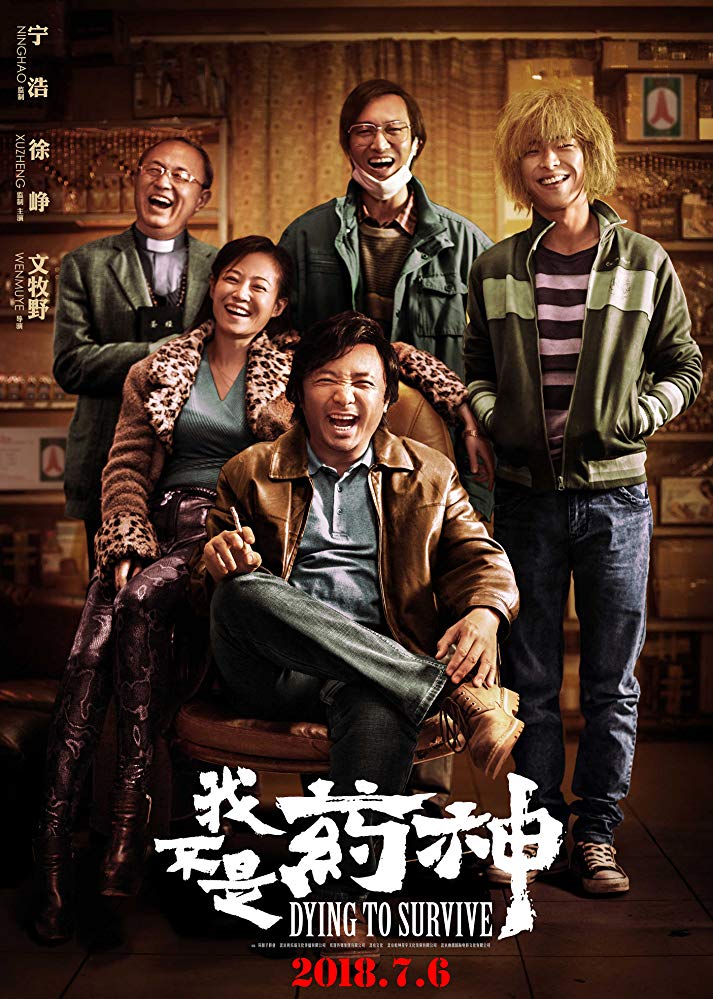Food For the Soul: At The Movies … At Other Countries
“If someone has to commit a crime in order to survive, society must take a look at itself and ask who the guilty ones really are.” Dr. Chen Zuo Bing, director of Kangfu Medical Center at Beijing University Hospital
By Nina Heyn, Your Culture Scout

Since Marvel superheros and various American action hits dominate movie multiplexes everywhere, it is easy to forget that in many parts of the world, local cinemagoers have their own problems and tastes that get served by local productions that are hardly seen outside their country of origin. Here is a look at two films that were playing to packed theaters with an immediacy of front-page headlines but they are unknown to Western audiences.
Dying To Survive (a.k.a. I’m Not A Drug God) is the Chinese blockbuster that grossed about $450 million since its July release and by now it is China’s third highest-grossing film but unfortunately it is not available abroad – you cannot even find an English-language trailer of it. This comedy-drama resonated so much with local audiences because it deals with a real, heart-tugging everyday problem that is not usually depicted in China amid the domestic fare of romance stories, silly comedies or historical dramas. Dying to Survive is loosely based on a true life story of a leukemia patient who smuggled cancer medicine from India in 2004. In the 2018 movie, the central character is played by a popular actor Xu Zheng (Lost in Thailand) as a small-time seller of ineffective aphrodisiacs who reluctantly starts the operation to pay for his child custody fight and his dad’s surgery. He is hardly a hero – he is rough-mannered, motivated by greed and not really plugged into not-his-own problem of cancer patients trying to get the medicine. As he starts to build his distribution network that consists of patients and their families, he learns compassion, courage and determination. His unlikely team of angels-smugglers consist of a mother, a punk thief who left his village to spare his parents from financial ruin, a Christian priest who initially only gets roped in because he can translate long-distance calls to India, and a quietly determined if awkward guy who is also a terminal cancer patient. The debuting director Wen Muye is careful to nuance his characters: patients-distributors are desperate enough to lie, cheat, or try to offer their bodies to ensure a supply, and the cops may be a bit sympathetic but law is law and they will haul the smuggler to prison anyway. The movie toggles between comedic moments of a confrontation between a quack medicine peddler and our little merry band of distributors, and extremely moving scenes of dying people who are turned down by hospitals since they cannot pay for treatment.
Life has written a happy ending to the real story of the medicine smuggler when charges were dropped after a thousand of his grateful patients-clients petitioned for his release from prison. The fictional account of this issue has also had a positive result. The movie sparked a public debate about the affordability of life-saving drugs in China and it is now part of the government campaign to lower prices of key medications.
Regardless of the immediacy of the social issue, this is also a terrific portrait of ordinary people who start by taking care of their own personal problem only to discover that they are part of something so much bigger and important. In this respect, the movie is reminiscent of the Polish director Krzysztof Kieslowski’s masterpiece Camera Buff(if you have a chance – check this old movie out too!)
Speaking of cinema in Poland, the current local blockbuster in that country is Clergy – a fearless denouncement of the unlimited power of the church after the communist power was removed in 1989. The movie’s subject is controversial in Poland and when Clergy was released in September the reactions for and against were extreme. There was a cinema that played it 24/7 and there was another theater where they held an exorcism in front of it.
As you can see even from the trailer, for anyone who does not live in Poland, this is not an easy movie to understand because there is hardly any point of reference. There is no other Christian country where the church’s power over hearts, minds and pockets would be as widespread as in Poland. Even though the subject of church excesses is hardly a taboo during dinner table conversations at Polish homes, the media generally stay away from the subject. Right wing media are staunch supporters of PiS, the right-wing party currently in power, and the opposition media is simply too afraid to take the church head-on. Enter the artist…
Wojtek Smarzowski is one of the most popular and uncompromising directors who has been a social conscience in his brilliant movies like Traffic Department (about the car mayhem that happens every day on Polish roads and the police who handle it) or The Wedding (a drama during the transformation period immediately after the fall of communism). His movies are satires, dramas and morality plays rolled into one and often served in a realistic, unflinching style of a brutal crime story. Such filmography makes him a natural candidate to tackle the sins connected to Polish church – rampant corruption, political lobbying, abuse of power, and pedophilia- that are really never addressed head-on. And these are just the big sins…
Clergy’s three protagonists are all priests whom we first meet at a drinking and carousing off-duty evening at home. They first met years ago during an accident and remain friends even though they pursue three different paths. Father Trybus (Robert Wieckiewicz, the star of Agnieszka Holland’s 2011 masterpiece movie In Darkness) is a country parishioner who likes his housekeeper to the point of getting her pregnant and his drink to the point of killing someone while drunk-driving. No wonder that his crisis of conscience is not far behind.
Father Kukula (Arkadiusz Jakubik) is another village priest who is losing faith. He dispiritedly charges cash for funerals and weddings and tries to forget his childhood as a kid molested by a priest- until the day he is chased through the village under suspicion of being a pedophile himself. Father Lisowski (Jacek Braciak) is a sophisticated career functionary in the bishop’s office. He fixes construction problems on a new cathedral building site (with bundles of cash from the bishop’s unlimited stash and an alliance with a local gangster), manages his utterly corrupt but dangerously powerful boss, and plots how to get transferred to the Vatican. To achieve this goal, he will have to bribe, spy, threaten and denounce but while this is all entertaining to watch, this is not his biggest sin. Molested as a child, he continues the vicious circle by going after boys in a local orphanage. This is one transgression that Kukula cannot understand or forgive. All three priests are heading towards a tragedy of loss – life, faith or conscience – whatever is greater for them.
As much as Dying to Survive has been met with both critical applause and unanimous admiration of Chinese audiences, Clergy did not enjoy a unified reception. It was controversial to the to the point of boycotts and direct attacks on media and cinemagoers but at the same it has beaten all the box office records in Polish cinema history.
Dying to Survive and Clergy are movies that are light years removed from typical Hollywood dramas on the subject of either drug availability or the church. The closest that an American movie came to tackling the health care drug coverage is Dallas Buyers Club (a 2013 movie about AIDS drug approvals and an Oscar for Matthew McConaughey). Spotlight covered pedophilia in the Catholic church and won a 2015 Best Picture Oscar, but you really “ain’t seen nothin'” on the subject until you have seen the punch-in-the-face Clergy.
These movies, created for audiences far away from Hollywood, are more raw and grounded, intellectually more complex, and they are focused on problems that the Western world does not experience in the same way. At the same time both are extremely powerful, emotional and unconventional stories that make them terrific movies to watch and allow an insight into societies you might never understand otherwise.
Check it out!
